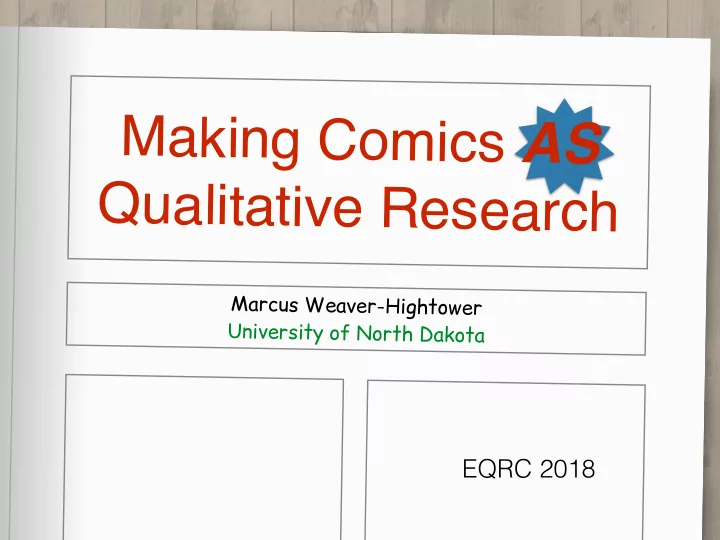

Making Comics AS Qualitative Research Marcus Weaver-Hightower University of North Dakota EQRC 2018
First, How am I defining “comics”?
Comics are a form, not a genre
Comics are a form, not a genre
Comics are a form, not a genre
Comics are a form, not a genre
Comics are a form, not a genre
Comics are a form, not a genre
Comics are a form, not a genre
Comics are a form, not a genre
Comics are a form, not a genre
Comics are a form, not a genre I can make it!
Comics are a form, not a genre I can make I can make it! it across the canyon!
Comics are a form, not a genre I can make I can make it! it across the canyon!
Comics are multimodal A B C
Chris Ware: “I believe that the expressive potentials of comics as a compositional art–with its combination of drawing, poetry, color, writing, pattern, rhythm, typography, and ‘music’ —allow for the greatest possible recreation of the complexity of experience that a printed page can offer.” (quoted in Rhoades, 2008, p. 36)
Comics-Based Research (CBR)
We use the term "comics-based research" to refer to a broad set of practices that use the comics form to collect, analyze, and/or disseminate scholarly research. Kuttner, Sousanis, and Weaver-Hightower (2017, p. 397)
Williams, R. M. C. (2012). Can you picture this? Activism, art, and public scholarship. Visual Arts Research, 38, 87-98.
Movement Speech Thought Description Narration Setting Sound Smells Gestures Time Expressions All things that we use in Emotion empirical qualitative inquiry!
Comic Artists’ Choices (McCloud, Making Comics, 2006) • Moment • Frame • Image • Word • Flow
All of these choices and affordances ≅ Traditional schema for analysis of Qualitative Data
“Traditional” Comic Topic Selection Topic Selection Literature Review Literature Review Interview Data Collection Observation & Informal Talk Restorying Data Analysis Thematizing Page Layouts Member Checking Validity/Trustworthiness Peer Debriefing Reflexive Journaling Choosing Words & Images Reporting Panel, Page and Comic Flow Citations
Examples
Published in Journal of Medical Humanities (2017; Online First 2015)
Part of the Process was very Traditional
Original Interview Comic Script Transcript (~2,300 words) (~13,000 words)
Recommend
More recommend